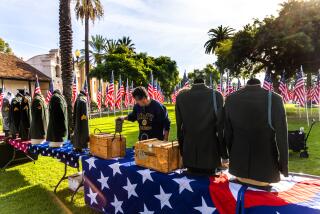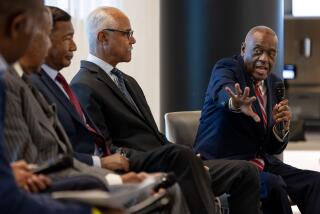A Battle for Honor : Family Wages a Campaign to Clear the Name of Court-Martialed Son
- Share via
Taking a war trophy from the battlefield is among a soldier’s oldest habits: To the victors go the spoils.
From the halls of Montezuma to the deserts of Iraq, thousands upon thousands of military veterans have returned with items ranging from Mexican swords to Iraqi AK-47s. It is a long and sometimes profitable tradition.
It is also illegal.
Ask Westlake High School alumnus Eric Pacheco.
The 22-year-old former football standout is finishing up a six-month sentence in an Army prison at Fort Knox for stealing a .357 magnum Desert Eagle handgun from a Haitian bunker he was ordered to guard.
Pacheco is the only soldier to be court-martialed in Haiti during the U.S. operation there.
An officer faces trial later this year for disobeying an order while in Haiti, but his case has nothing to do with war trophies. Only Pacheco has that dubious distinction.
He wonders why and feels like a scapegoat.
“A numerous number of weapons came up missing,” Pacheco said in a collect telephone call from Fort Knox. “The command had to bring somebody up on charges to take care of the problem. They were really anxious to get a court-martial down in Haiti. I’m the only one in jail.”
He lost more than his freedom. Pacheco had six months to go before his three-year enlistment was over. He had accrued $23,000 toward his college education and talked of re-enlisting if he could get into the Army’s physical therapy program. He had been promoted three ranks in his time in the service, from E-1 to E-4.
If his enlistment ended at Fort Drum in New York on a good note, Pacheco would have had all the benefits of a veteran in good standing: access to military medical care, low-interest home loans and the other accouterments of serving in the armed forces.
Now, that is all gone because of a single Desert Eagle handgun: $1,500, retail. Gone too is his hard-earned reputation back home. Employers will want to know the details of Pacheco’s exit from the Army. His neighbors and friends already know.
“I just want my name cleared,” he said.
So do his parents.
As Pacheco mops the prison’s floors, writes letters home, watches a little television and counts the days to his May 28 release, his parents, Ernest and Betty Pacheco, are working full time to erase this blemish.
Eric claims he was convicted and jailed for simply following orders. His parents agree and have shelled out $5,000 to have an outside attorney look at the case. Meanwhile, from her wheelchair and in front of her word processor, Betty is waging a relentless and prolific fight to clear the name of her only son.
She has written President Clinton, California’s senators, several U.S. representatives and a score of Army officers. She has included reference letters from Eric’s high school football coach, parish priest and former bosses in her dispatches.
She began her campaign with a manual typewriter, which she quickly wore out. Her husband recently bought her a word processor. She can now reach more government officials more quickly.
“Every day my son is in prison, I am in prison also,” she wrote to Maj. Gen. David C. Meade, commander at Fort Drum. “I am dedicating the rest of my life to discouraging my 10-year-old grandson from any connection with the military.”
Pacheco has maintained that a sergeant ordered him to take the gun. Besides, Pacheco said, many weapons disappeared from the nine bunkers his company uncovered in the hills of Haiti in September. Numerous Desert Eagles, Howitzer cannon rounds, antiaircraft guns, grenade launchers, shotguns, machine guns, Uzis and a Red Ryder B. B. gun were found in the bunkers. Many soldiers helped themselves to the booty, Pacheco said.
The military, however, sees it differently.
“To be honest, there were probably other people involved (in stealing guns),” said Lt. Col. Karl K. Warren, a prosecuting attorney. But, he said, prosecutors only had solid evidence against Pacheco and his sergeant, who ordered Pacheco into the bunker. The sergeant provided the evidence by agreeing to testify against Pacheco. The sergeant left the Army with an other-than-honorable discharge. In exchange, he avoided a court-martial, Warren said.
“There was a standing order that no war trophies whatsoever were to be taken,” Warren said. “He was found guilty of disobeying that order.”
Eric was defended by an Army-appointed defense counsel, who declined to comment on the case.
“I can’t,” Capt. John Bickers said. “Regulations.”
The attorney hired by the family, Boston-based Lewis Font, did not have much to add, having just received the lengthy trial transcript. However, he noted that Pacheco’s court-martial took all of two months--quick by any standard.
“Swift justice is the best justice,” prosecutor Warner said.
Critics of the military justice system said the war trophy issue has become a public relations nightmare for the military, especially during unpopular invasions and operations. Consequently, examples have to be made when weapons disappear from the battlefield.
“This was pretty much an accepted practice until the Vietnam War,” said Tod Ensign, director of the nonprofit military watchdog group Citizen Soldier. “But even then, it was condoned.”
But then, Ensign said, the military slowly began to change its stance as television treated the public to various unsavory scenes of triumphant fighters in Vietnam, including gleeful American soldiers holding the severed heads of enemy combatants.
Then the U.S. Navy and Marines received unfavorable attention when an admiral was reprimanded and several enlisted men were court-martialed more than a decade ago for similar offenses during the Grenada invasion.
“Guys are always bringing war trophies in,” said Mike Pinner, manager of a Ventura military surplus store. “Everybody who served has got a trinket.”
More recently, thousands of Desert Storm veterans returned to the United States with millions of dollars’ worth of war trophies that found their way to Army surplus shelves and gun stores. A lieutenant colonel was stripped of his command, docked a month’s pay and given a letter of reprimand after three Iraqi automatic rifles were found in his footlocker.
“Overall, you have a shift in policy on,” Ensign said. “The military is always concerned about the proper image.”
And sometimes an individual gets run over as the military marches toward that proper image, Ensign said.
“You get that big repressive machine going and you can’t stop it,” Ensign said.
Today, the Pachecos say they wonder how they got caught in the gears of that machine.
Life--up until now--had been relatively uneventful and smooth for the Pachecos.
They have lived and worked in Thousand Oaks for 29 years. They are good friends with their neighbors. They attend church. Their hard work early in life has paid off in a blue-collar affluence seldom seen today.
They raised three daughters and a son in their four-bedroom house, which they bought long before Proposition 13 and back when a construction worker such as Ernest Pacheco could afford to buy in Southern California.
Their oversized driveway is crowded with late-model, American-made automobiles and a large boat. Ernest fancies wearing “Made in America” T-shirts and laments the closing of his hometown’s only bowling alley.
The walls inside their well-kept home are crowded with photographs of their smiling children and their children’s children. Out back, the yard is manicured and includes a working fountain.
The American dream had, until Dec. 6, worked for the Pachecos.
That was the day Eric turned 22. That was the day he called home to tell his family that he was to be court-martialed. Eric told his family not to worry, that his sergeant ordered him to take the gun. He expected to be acquitted.
Now the family, as Betty put it, “is all cried out” and simply awaiting their son’s return. For his part, Ernest wonders what to do with his honorable discharge from the Navy hanging prominently from his den wall, alongside a black-and-white photograph of him and some of his shipmates.
He agonizes over whether or not to take down those Korean War mementos before his son comes home.
He wonders how his son--who will be given a bad-conduct discharge when released from prison--will feel when he sees his father’s honorable discharge.
More to Read
Sign up for Essential California
The most important California stories and recommendations in your inbox every morning.
You may occasionally receive promotional content from the Los Angeles Times.













